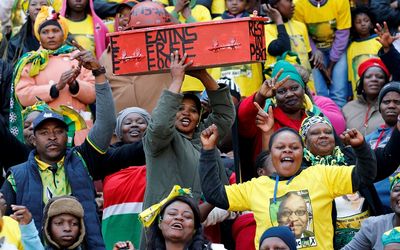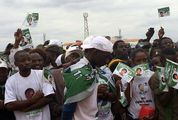THE idea of one-party dominance has shaped a good deal of political analysis since 1994. The overwhelming political power of the ANC has been viewed both positively and negatively.
Governing party sympathisers have portrayed ANC control as the only sure way to stabilise a divided society, to widen economic opportunities and to entrench democratic politics. Inequality and racial division, from this view, have been major threats to social stability. The ANC has managed such potential conflicts internally, balancing state and party appointments, cajoling different races to work together, and clamping down on potentially anti-democratic leaders. Robust multi-party competition, in contrast, would have destabilised a political system that lacked sound, legitimate and trusted institutions.
The negative view of ANC dominance has been argued equally vehemently. Elections without the countervailing power of a credible opposition, this argument runs, cannot check authoritarian tendencies. Party dominance encourages an arrogant governing party to view itself as the state; it allows patronage politics to grow unchecked; and it facilitates the abuse of the incumbency advantages, money and media control in order to secure re-election.
READ THIS: Youth league urges ANC to hold elective conference sooner to ‘regenerate’ itself
Both these sets of insights are illuminating (although many commentators have embraced only one or the other). One positive interpretation of the local government elections is that the country is escaping the dilemmas that dominance potentially creates. Over the past 20 years, the ANC has indeed entrenched the legitimacy of democratic institutions – for example, the courts and the electoral commission – by making them more racially representative and by aligning them to a constitutional order. South Africans have meanwhile become accustomed to free and fair elections and will not lightly consent to their manipulation.
Meanwhile, the opposition parties that once evidently lacked the ability to govern a complex society have gradually acquired such capabilities. The DA, in particular, has learnt how to govern in big cities and provinces, how to build coalitions, and how to recognise, and partially manage, the legacies of racial oppression.
READ THIS: Mayor Athol Trollip will outline his 100-day plan for Nelson Mandela Bay next week
This rosy view suggests that democracy may not merely survive, but also thrive, in the years ahead. Elections will become sites of political uncertainty, in which parties will need to respond to electors’ values and demands in order to win. The ANC may still govern, but it will need to remake itself in order to do so. Opposition parties, for their part, will have to remain open to coalition and compromise, and to reach out beyond their core constituencies.
Perhaps this is too rosy a view. The EFF may rejoin the ANC in 2019, taking opposition politics back to square one. The ANC leadership might take an authoritarian turn, trying to rig elections and curtail political competition. The legacies of apartheid, meanwhile, mean that inequality and injustice will continue to provide opportunities for racial mobilisation for decades to come.
The ANC, however, is a vast, sprawling and ideologically diverse movement that is very unlikely to fall under the effective control of an authoritarian leadership. The securocrats with whom President Jacob Zuma has surrounded himself, and even the celebrated ‘premier league’, lack the capabilities required to cement anti-democratic one-party rule.
A more real danger is that the game of democratic politics will distract political leaders’ attention from the constraints that the economy places on any government’s actions. The ‘dominant’ ANC’s most important achievement since 1994 has been its steadfast maintenance of prudent fiscal and monetary policy, despite all of the pressures and temptations to abandon it. For this accomplishment, it has been ridiculed and lambasted for two decades by self-indulgent commentators, trade unionists, civil society activists and scholars. The key hazard of a more competitive era of democratic politics is that symbolic and populist economic policies will become inescapable for any party that wishes to win power.
• Butler teaches public policy at the University of Cape Town

The ANC is not in a growth phase. For the past decade its trajectory has been downhill as it grapples with a radically changed opposition. Picture: REUTERS/SIPHIWE SIBEKO
THE idea of one-party dominance has shaped a good deal of political analysis since 1994. The overwhelming political power of the ANC has been viewed both positively and negatively.
Governing party sympathisers have portrayed ANC control as the only sure way to stabilise a divided society, to widen economic opportunities and to entrench democratic politics. Inequality and racial division, from this view, have been major threats to social stability. The ANC has managed such potential conflicts internally, balancing state and party appointments, cajoling different races to work together, and clamping down on potentially anti-democratic leaders. Robust multi-party competition, in contrast, would have destabilised a political system that lacked sound, legitimate and trusted institutions.
The negative view of ANC dominance has been argued equally vehemently. Elections without the countervailing power of a credible opposition, this argument runs, cannot check authoritarian tendencies. Party dominance encourages an arrogant governing party to view itself as the state; it allows patronage politics to grow unchecked; and it facilitates the abuse of the incumbency advantages, money and media control in order to secure re-election.
READ THIS: Youth league urges ANC to hold elective conference sooner to ‘regenerate’ itself
Both these sets of insights are illuminating (although many commentators have embraced only one or the other). One positive interpretation of the local government elections is that the country is escaping the dilemmas that dominance potentially creates. Over the past 20 years, the ANC has indeed entrenched the legitimacy of democratic institutions – for example, the courts and the electoral commission – by making them more racially representative and by aligning them to a constitutional order. South Africans have meanwhile become accustomed to free and fair elections and will not lightly consent to their manipulation.
Meanwhile, the opposition parties that once evidently lacked the ability to govern a complex society have gradually acquired such capabilities. The DA, in particular, has learnt how to govern in big cities and provinces, how to build coalitions, and how to recognise, and partially manage, the legacies of racial oppression.
READ THIS: Mayor Athol Trollip will outline his 100-day plan for Nelson Mandela Bay next week
This rosy view suggests that democracy may not merely survive, but also thrive, in the years ahead. Elections will become sites of political uncertainty, in which parties will need to respond to electors’ values and demands in order to win. The ANC may still govern, but it will need to remake itself in order to do so. Opposition parties, for their part, will have to remain open to coalition and compromise, and to reach out beyond their core constituencies.
Perhaps this is too rosy a view. The EFF may rejoin the ANC in 2019, taking opposition politics back to square one. The ANC leadership might take an authoritarian turn, trying to rig elections and curtail political competition. The legacies of apartheid, meanwhile, mean that inequality and injustice will continue to provide opportunities for racial mobilisation for decades to come.
The ANC, however, is a vast, sprawling and ideologically diverse movement that is very unlikely to fall under the effective control of an authoritarian leadership. The securocrats with whom President Jacob Zuma has surrounded himself, and even the celebrated ‘premier league’, lack the capabilities required to cement anti-democratic one-party rule.
A more real danger is that the game of democratic politics will distract political leaders’ attention from the constraints that the economy places on any government’s actions. The ‘dominant’ ANC’s most important achievement since 1994 has been its steadfast maintenance of prudent fiscal and monetary policy, despite all of the pressures and temptations to abandon it. For this accomplishment, it has been ridiculed and lambasted for two decades by self-indulgent commentators, trade unionists, civil society activists and scholars. The key hazard of a more competitive era of democratic politics is that symbolic and populist economic policies will become inescapable for any party that wishes to win power.
• Butler teaches public policy at the University of Cape Town




















